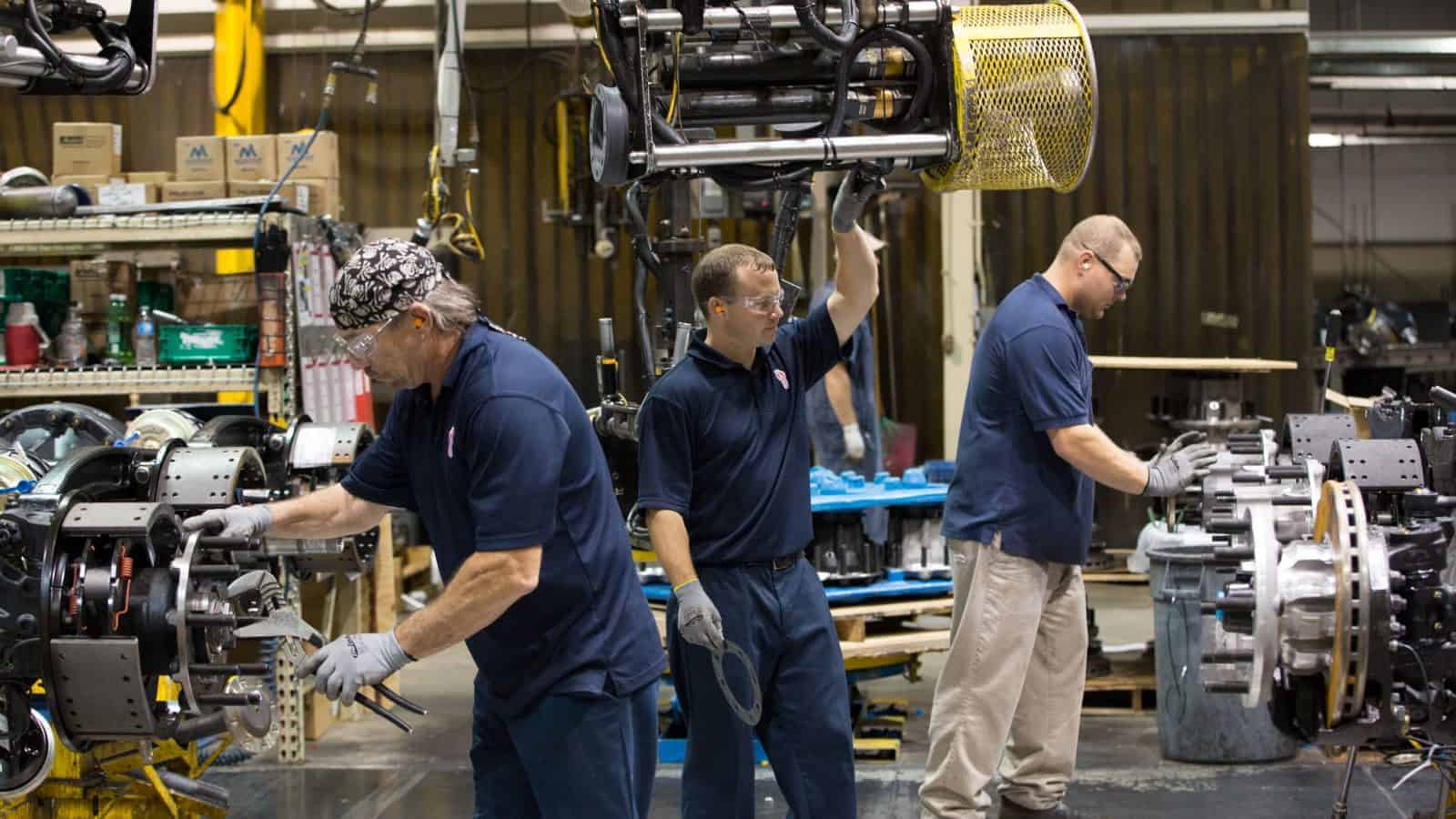Get Ready for MFG Day 2021!
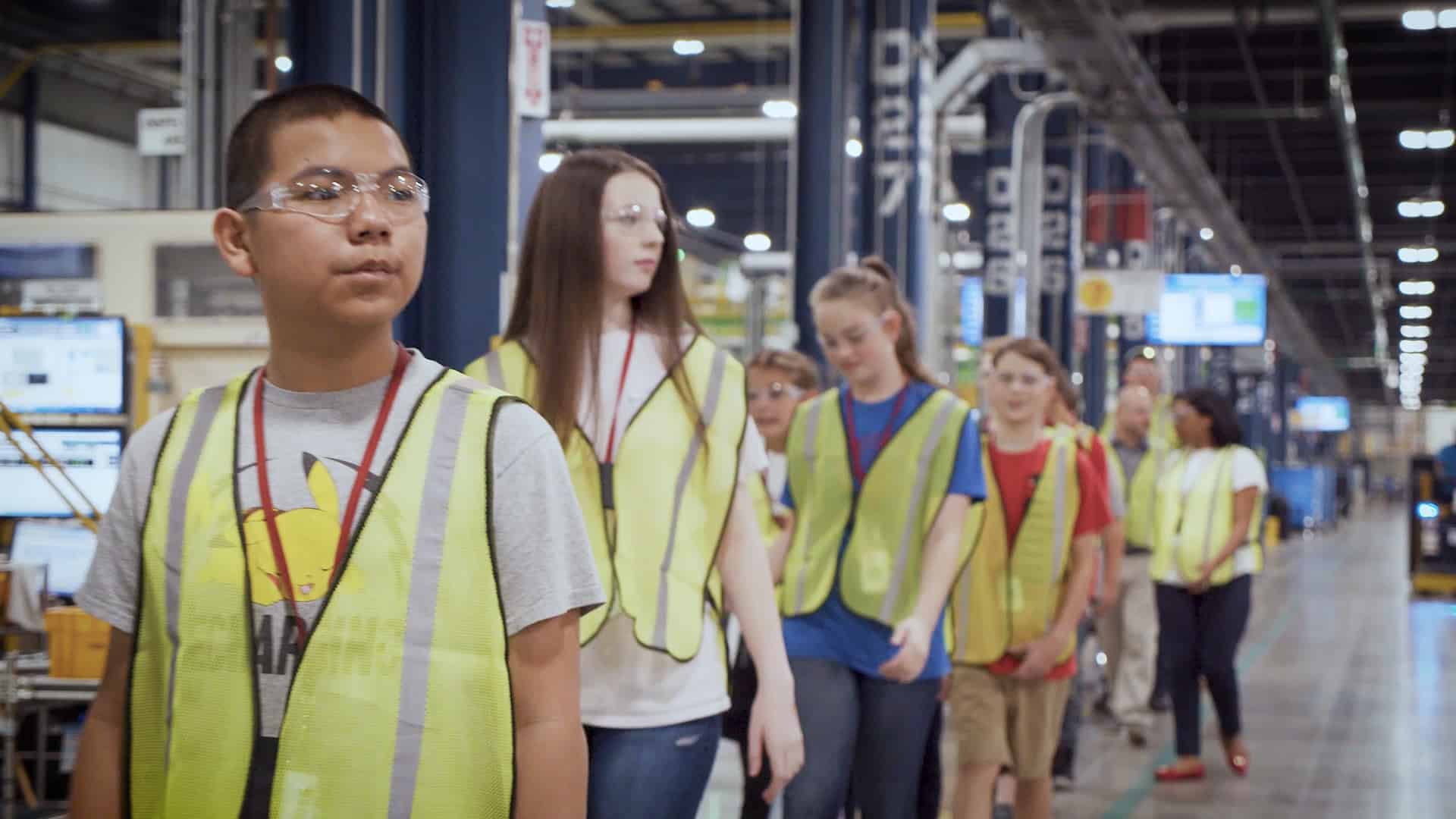
We’re just two months away from MFG Day 2021! If you’re a manufacturer and you haven’t done so already, it’s time to start thinking about hosting an event.
Amplifying the “Creators Wanted” message, MFG Day—which officially falls on October 1 but will be celebrated throughout the rest of the month—is manufacturing’s biggest celebration of the year, a chance for parents, students and educators to step inside the industry and see everything it has to offer. It’s nothing less than our biggest annual opportunity to “solve the workforce–development crisis,” as MI Senior Director of Student Engagement Julia Asoni put it during a recent webinar.
Here’s what you need to know.
The crisis: Manufacturers will need to hire 4 million workers between now and 2030 to account for growth and fill positions left open by retiring workers, according to a recent study by Deloitte and the MI. Yet 2.1 million of those jobs could go unfilled because of the skills gap.
- “The solution is to inspire the next generation of manufacturers and educate students, parents, teachers and the public on the important role that manufacturers play in our lives,” Asoni said.
Making a difference: In 2019, more than 325,000 MFG Day participants took part in 3,000 events across North America, Asoni noted. Afterward, 72% said they now believed “manufacturing provides an interesting and rewarding career.”
- MFG Day 2020 moved online due to the pandemic, but this year, it’s back in force and in person.
What can you do? Manufacturers that wish to host an event this MFG Day but don’t know where to start have come to the right place.
- In-person options: Facility tours, open houses, community gatherings and expos, roundtable discussions and job fairs all make excellent events, Asoni said.
- Go virtual: Virtual events can be successful, too. Consider Zoom, GoTo Meeting, Instagram Live, Facebook or a specific school platform (if working in partnership with a school). Interested in hosting a 3D-mapped, virtual experience for MFG Day? Contact NAM AVP of Strategic Partnerships Chris Schmitt at [email protected].
- “What will participants do?” Engaging working employees during onsite tours is crucial, Asoni said. “Personal experience has the greatest impact on perception change, according to research.” So get creative when thinking through your visits and walk-throughs!
- “Whom do we invite?” Reach out to local schools and community-based organizations, such as nearby Boys & Girls Clubs of America. BGCA can be contacted for partnership purposes at [email protected].
- Learn more about MFG Day through our full page of MFG Day resources. And listen to prior best practices shared by MFG Day hosts on a webinar hosted last month.
Register your event: Be sure to register your MFG Day events by the end of August. This will help people find them and sign up.
Calls to action: MFG Day event hosts should each have their own calls to action—steps that attendees can take to keep engaging with manufacturing. This could be signing up for a company newsletter, following the company on social-media channels or attending another event, such as a career day.
- This year, we’re launching a built-in call to action to engage students year-round. Stay tuned for more information in September!
Check it out: As MFG Day nears, keep checking in on CreatorsWanted.org. It will be updated and refreshed continually up to Oct. 1 with new MFG Day resources, along with updates on the broader Creators Wanted campaign to help inspire, educate and empower the next generation of manufacturing talent.
More support: Need a bit more help? Join us for some real-time Q&A during one of our upcoming MFG Day Office Hours.
To the Moon and Then Mars: An Interview with a STEP Honoree

Jennifer Boland-Masterson originally got excited about manufacturing because of the robots. The Indiana native later graduated from Purdue University with a degree in electrical engineering, then worked in the automotive and boat industries before joining Boeing. Today, she is Boeing’s director of operations, Space Launch System, and leads the team that is building NASA’s SLS rocket—the most powerful rocket in development today.
“The plan is to get us back to the moon, and then to Mars, and this rocket has the payload to make it happen,” says Boland-Masterson. “We’re building the next generation of the space program, and that’s my day-to-day.”
A manufacturing advocate: Boland-Masterson was recently selected by The Manufacturing Institute as a 2021 STEP Ahead Award Honoree—an honor given to women leaders who have excelled both within their companies and in the industry as a whole. She sees sharing stories as an important way of encouraging other young women to go into manufacturing and frequently attends science, technology, engineering and math events in her community to demystify the industry for young people and their parents.
- “The earlier that girls and their parents understand that STEM events are not just for boys, and [the earlier] they see role models in the fields they aspire to be in, the better,” says Boland-Masterson. “It gives them that energy. They realize, hey, I can do that too.”

- “It might look male-dominated, but the dynamics are changing,” she adds. “You’re seeing more diversity in these engineering, tech, science areas. It’s exciting to see that change.”
It takes a village—and some confidence: Boland-Masterson emphasizes the importance of teamwork and of being able to build a community among your friends and colleagues.
- “Make sure you have a good support system,” she advises young people. “We can’t do it by ourselves. We have to have people we can ask for advice or help. Whether you’re a woman or a man, everyone needs that support system.”
- “We all will have challenges, but that’s okay,” she adds. “You’re your number one fan, and when you believe in yourself, you can accomplish anything and everything you want.”
An unexpected journey: Even as someone who hoped to go into manufacturing from an early age, Boland-Masterson was surprised by the range of opportunities she encountered in the industry. Her work has turned out to be both international and interplanetary.
- “I would never have imagined as a kid that I would be building a rocket that will carry astronauts into deep space,” says Boland-Masterson. “I would never have guessed. Growing up in Indiana, I thought I would stay in Indiana my whole life. But getting into manufacturing, I’ve had an opportunity to go across the country and around the world.”
And does she work with robots?: “Believe it or not, I don’t work with any robots,” Boland-Masterson says, laughing. “My day-to-day is all about human interaction. But I say keep an open mind and that will take you to wonderful, unexpected places.”
Creators Wanted Gets an Endorsement
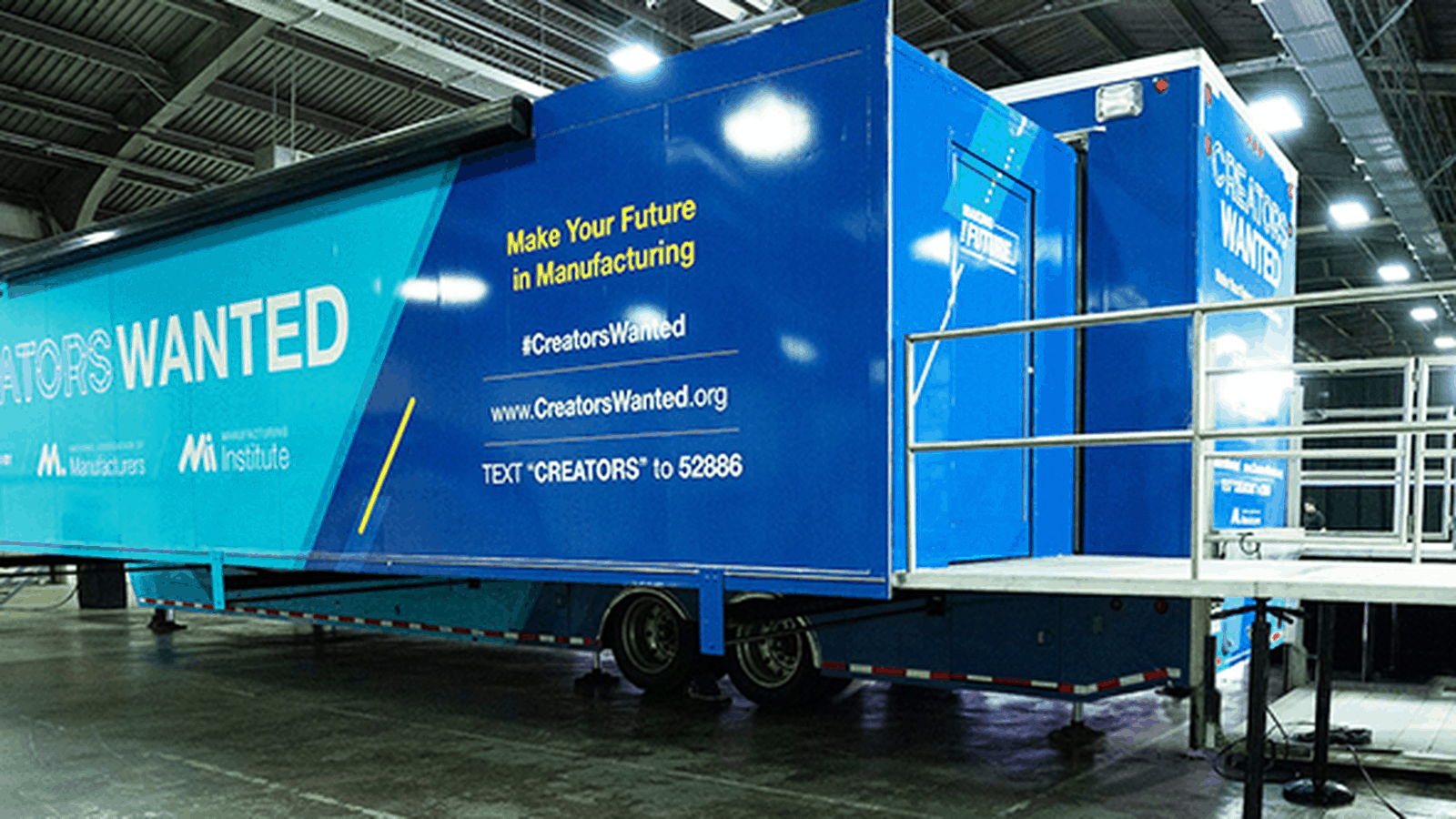
The NAM and The Manufacturing Institute’s Creators Wanted campaign got a resounding endorsement from The Dallas Morning News, which called the initiative “a smart approach that may be a harbinger of things to come” in a recent editorial (subscription).
Traveling attraction: “‘Creators Wanted’ . . . will visit schools and community gathering places around the country in coming months to attract future workers to that industry. Creators Wanted features a tractor-trailer-mounted escape room and ‘immersive experience’ designed to hold kids’ attention while also overcoming stereotypes that keep students from choosing careers in manufacturing.”
Filling a void: As the editorial notes, Creators Wanted “aims to reduce the skills gap in the U.S. by 600,000 workers by 2025, and increase the number of students enrolling in technical/vocational schools or reselling programs by 25%.”
- While the article focused on the activities of the campaign, the sustained initiatives of The Manufacturing Institute are also important to reaching these goals.
Sign of changing times: The NAM’s and MI’s focus on students is “smart,” says the editorial, in light of changing perceptions among youth about higher education. The pandemic and soaring tuition are causing young people to consider options besides college.
The last word: “Creators Wanted is a clever approach that teens will enjoy. We encourage parents and guidance counselors to consider it. But the larger point here is about the pipeline of workers needed to ensure our economy can continue to grow. NAM has taken the initiative to improve that pipeline, putting them ahead of the competition for now. We hope to see others join that race soon.”
Join in: Interested in supporting Creators Wanted? Contact Creators Wanted Finance Director Barret Kedzior at [email protected].
Charlotte Pipe and Foundry Keeps Promises to Employees
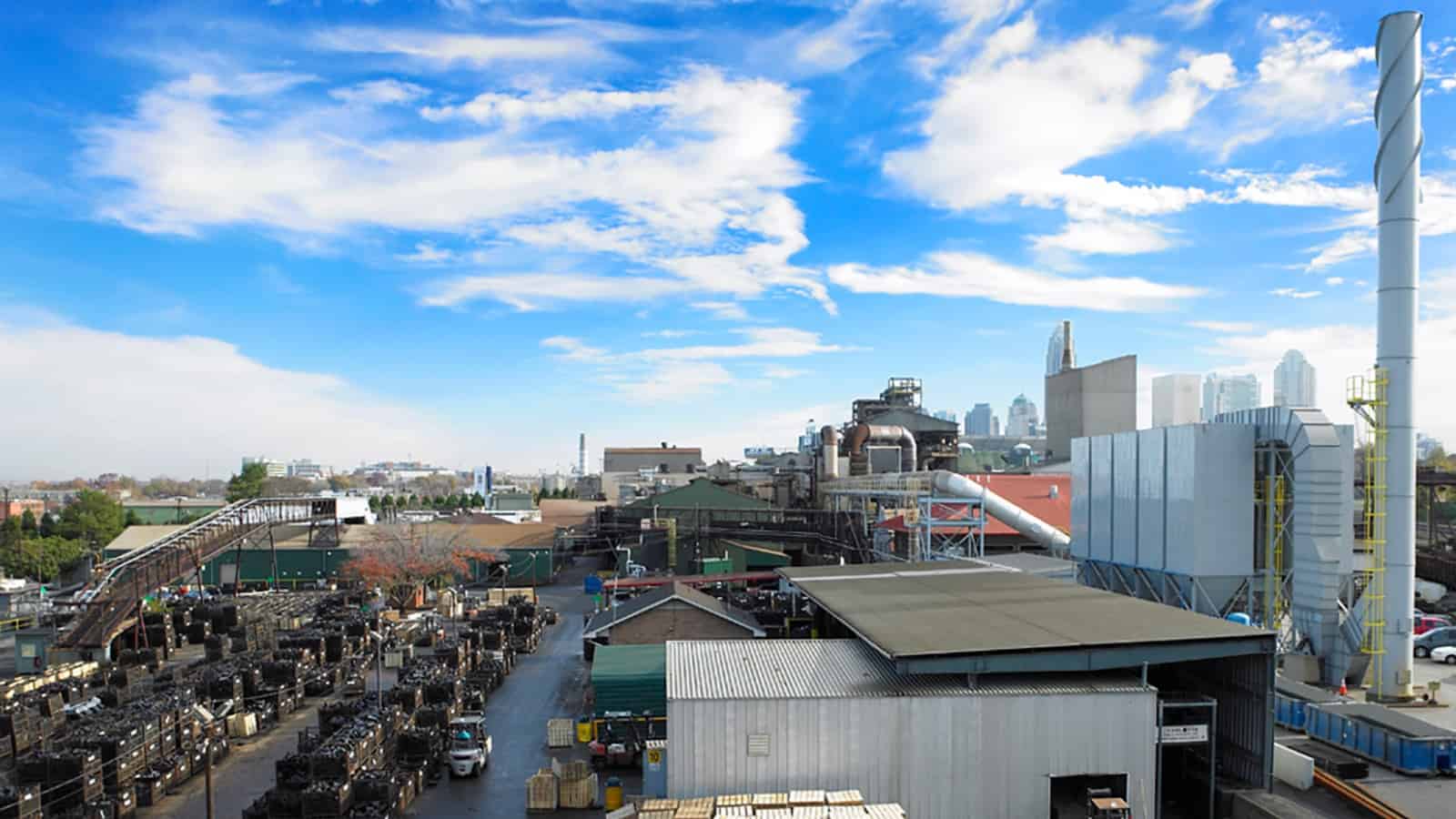
Charlotte Pipe and Foundry Company is a 120-year-old, fifth-generation family-owned business—and it tries to treat its employees like family, too.
“We have a long tradition and history of taking care of our associates,” said Charlotte Pipe Vice President of Marketing Bradford Muller. “We haven’t had a layoff since the early 1980s. Even in the Great Recession, we kept people working as many hours as we could give them.”
When the 2017 tax reform law gave Charlotte Pipe more certainty, the company passed along the good fortune, supporting employees, adding new jobs and investing in the future of the business.
New bonuses: When the legislation passed, Charlotte Pipe gave every employee an additional bonus of $1,000. Over the past few years, it has continued to offer high wages and generous health benefits to its associates as well as contributing to the company’s 401(k) plan. Charlotte Pipe has also absorbed a large portion of the increases in the health care costs of its workers.
New jobs: Tax reform has also allowed Charlotte Pipe to bring on new workers. Since the law passed, the company has hired more than 200 associates as it increases production across the country.
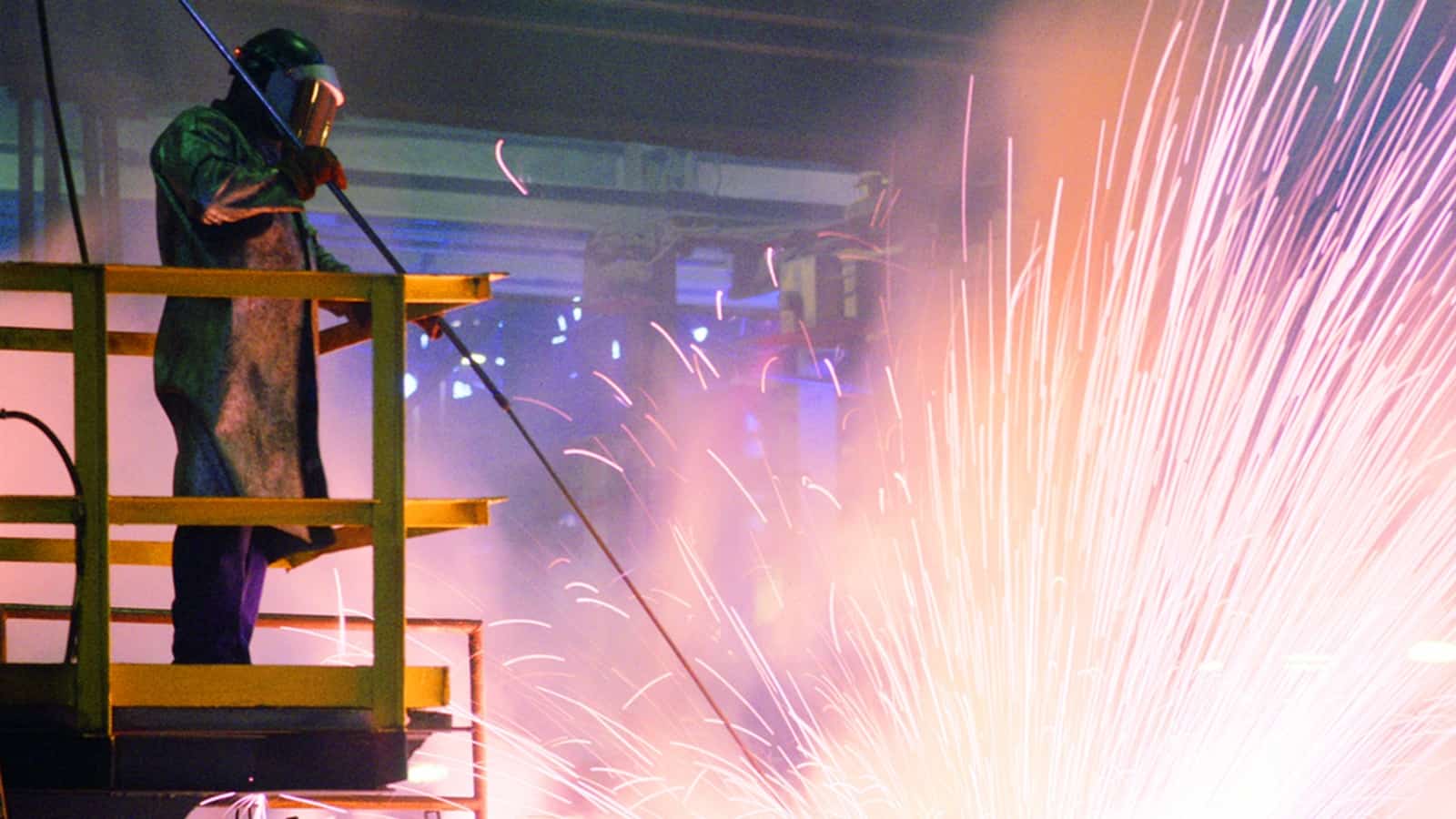
New business: Charlotte Pipe is also investing in its future by building a new foundry, which will create new jobs in its surrounding community. In addition to making the company more efficient and effective, the new cutting-edge foundry will help it keep up with international competitors from places like China. Muller credits tax reform with making that investment possible.
- “The certainty around tax reform and regulatory reform gave us the confidence to be able to proceed with this once-in-a-century, $350 million foundry,” said Muller. “It’s a huge financial commitment, and we needed policy certainty to be able to do that. That was one of the reasons we were able to launch that project.”
Ongoing investment: The foundry may be the biggest example of a capital investment, but it is by no means the only one. In fact, Charlotte Pipe reinvests most of its profits back into the business, allowing it to keep working, innovating and providing new jobs.
- “We reinvest most of our profits into capital projects,” said Muller. “The more revenue we have, the more people we can hire, the more equipment we can buy and the more productive we can be.”
The last word: “When tax reform helps a business provide for its employees and create opportunity well into its second century, you know that reform is worth keeping,” said NAM President and CEO Jay Timmons. “Manufacturers like Charlotte Pipe are building on the foundation of tax reform, and their workers are prospering because of it. That’s why we need to protect against potentially harmful tax hikes.”
How Manufacturers Can Retain Employees
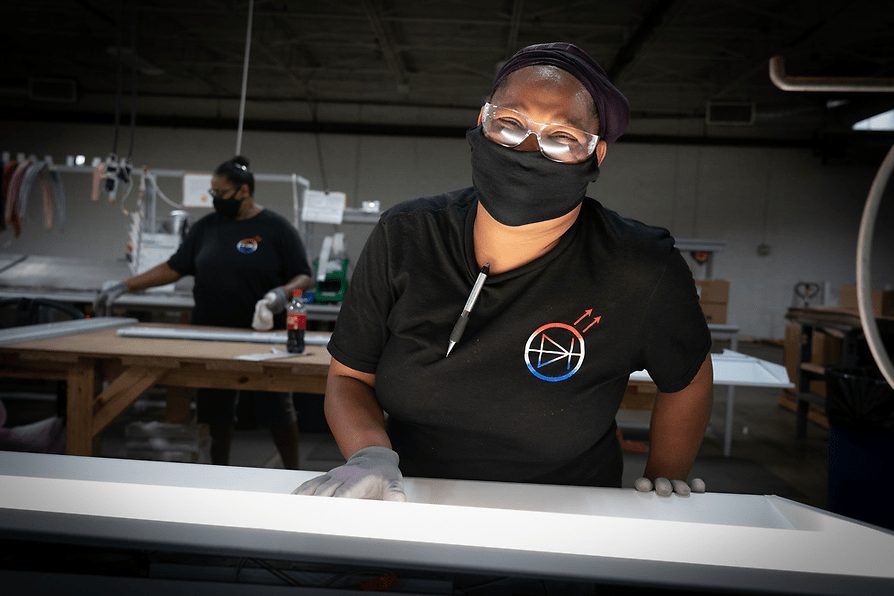
With manufacturers facing a skills gap that could result in 2.1 million unfilled jobs by 2030, retaining qualified and effective employees is critical. But how do manufacturing leaders keep great employees on staff? The Manufacturing Institute’s Center for Manufacturing Research and the American Psychological Association have some answers, collected in their recently published Manufacturing Engagement and Retention Study.
Why people stay: According to the study, the main reasons that employees remain at a company are enjoyment of the work (83%) and stability/job security (79%). Other contributors to satisfaction include the family friendliness of the employer and the way the job fits into their lifestyles outside of work.
- The next generation, however, has slightly different motives: “Although fewer survey respondents overall (42%) identified training and career opportunities as reasons for staying, around two-thirds of those under age 25 said these were motivating factors in their decision to remain with their current employer (69% and 65%, respectively).”
Feeling good: Employees who felt valued by their companies had significant more motivation and job satisfaction.
- Nearly all workers who said they felt valued by their employers (97%) described themselves as highly motivated and satisfied with their jobs. Nearly as many (96%) would recommend their company to others as a good place to work.
- Meanwhile, among employees who did not feel valued by their employers, those numbers dropped to 45% and 25%, respectively.
Fair treatment: Workers who felt that their employers treated them fairly were also less likely to be stressed out on a typical workday (at only 16%). But among workers who said they were treated unfairly, 68% felt stressed on a regular basis.
- Those who felt that they were treated fairly were also much less likely to say they intended to look for a new job within the next year—at just 2% versus 19% among those who felt they were treated unfairly.
Pandemic effects: The MI and APA conducted this study during the COVID-19 pandemic, which notably did not affect employees’ responses to a great degree. In fact, many felt more positive about their employers.
- A majority of employees (58%) said the pandemic and their company’s response to it had not changed their view, and more than one-third (37%) had a more positive view of the company, compared to just 5% who viewed their employer more negatively.
Find out more: Learn more about what motivates people to stay by reading the full study here.
A Second Chance in Manufacturing Pays Dividends
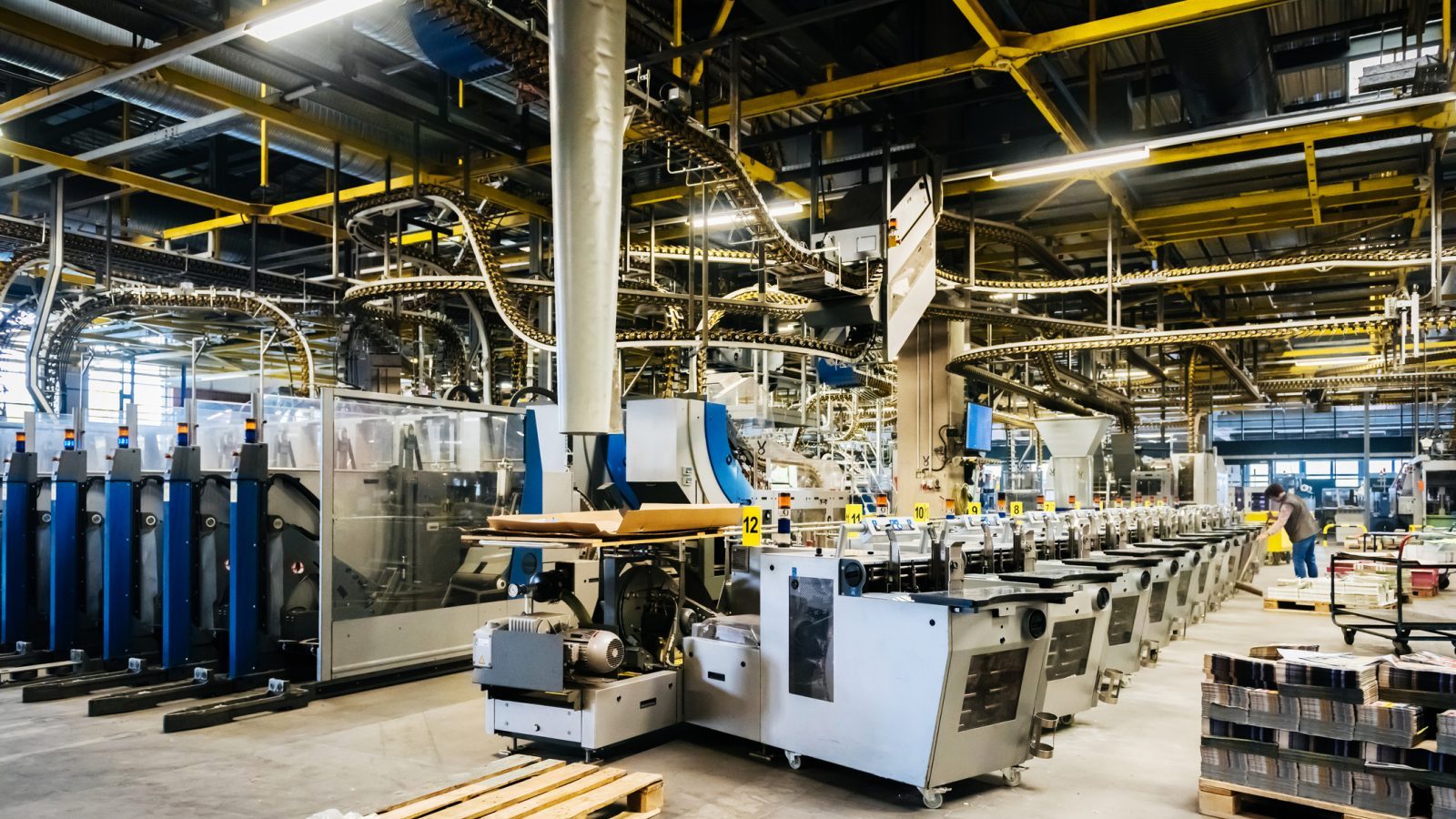
One of manufacturers’ top concerns is the insufficient number of skilled workers available to fill their open jobs. Yet right before us is an often-overlooked pool of millions of potentially strong employees: people with criminal records.
That’s why The Manufacturing Institute has partnered with Stand Together and the Charles Koch Institute to promote “second chance” hiring—to get these workers who need jobs into jobs that need them. Recently, the MI hosted its first webinar on the importance of this initiative and what manufacturers should know about it.
The data: One in three Americans has a criminal record, and yet this entire population is frequently discounted outright during employer job searches due to societal stigma and general misperceptions. During the webinar, the panelists shared some additional data:
- Of the approximately 19 million Americans with felony convictions on their records, some 1 million are incarcerated and some have aged out of the workforce, said Jeff Korzenik, author of “Untapped Talent: How Second Chance Hiring Works for Your Business and the Community” and chief investment strategist for Fifth Third Bank. “But millions are of working age, [and] virtually all of them are unable to participate to the fullest extent of their possibility, of their talents, because of barriers.”
Talent shortage: 814,000 manufacturing jobs were unfilled as of May, according to the Bureau of Labor Statistics.
- “Manufacturers continue to tell us that attracting and retaining workers remains one of their top challenges,” said MI Executive Director Carolyn Lee during the webinar.
- 2.1 million manufacturing jobs could go unfilled by the end of the decade if current trends continue, according to a recent MI and Deloitte study, and that “could mean the loss of up to $1 trillion in lost economic impact for the U.S.”
Worth the work: Employers who identify and support a strong candidate with a criminal record “get an employee who is on average more engaged and more loyal” than other workers, said Korzenik, who called this method of hiring the “second chance model.” This can lead to higher retention rates, saving an organization on turnover costs, he added.
- The model, which Korzenik developed, both identifies characteristics likely to lead to successful employment (strong character, soft and hard skills) and provides support processes (such as help with transportation to and from work) to help bridge gaps.
Living proof: Webinar panelist Cory Webb is a recent graduate of the Cuyahoga County, Ohio–based ACCESS to Manufacturing Careers, a program that trains both young people and people with criminal records for careers in manufacturing. He considers himself a testament to ACCESS’ success.
- “I started this program because I thought it would be a great opportunity for me to gain a career in manufacturing and machine operating,” said Webb, now an auxiliary operator for program participant Jergens Inc. The initiative “did a pretty good job as far as getting me prepared … for machine operating,” he said.
Learn more: The MI has released a host of resources for manufacturers interested in second chance hiring. You can find them here.
MI Announces 2021 STEP Honorees
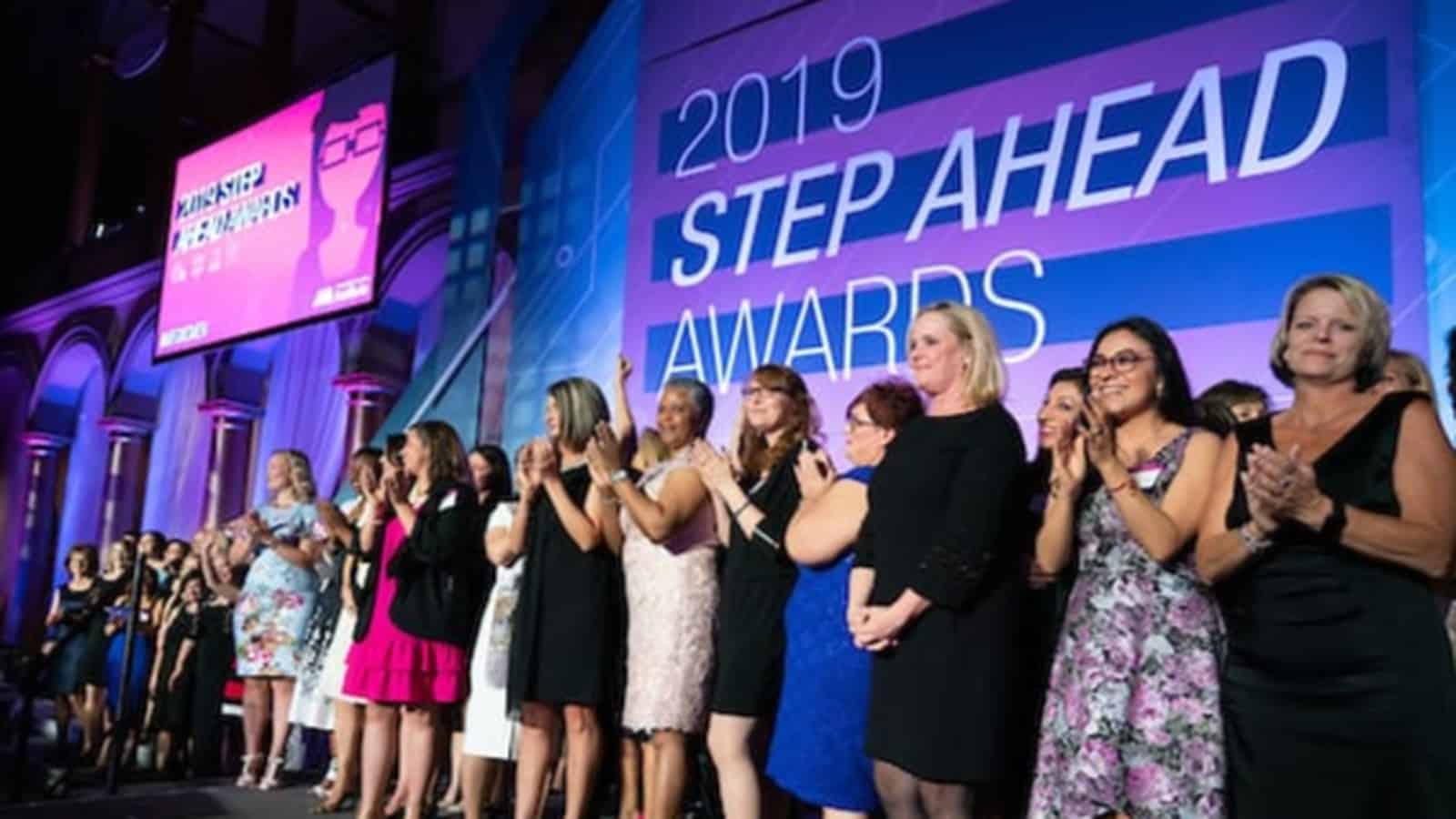
The Manufacturing Institute has announced its newest cohort of extraordinary female leaders in manufacturing: the 130 Honorees of the 2021 STEP Ahead Awards. On Nov. 4, the MI will recognize their achievements at an in-person gala in Washington, D.C.
An industry-wide honor: These yearly awards, part of the MI’s STEP Women’s Initiative, recognize women in manufacturing who exemplify excellence from the factory floor to the C-suite.
- To date, the awards have honored 932 exceptional women, and the winners have made an impact—through mentoring, programs and events and more—on 300,000 people, from industry peers to kids in school.
The whole initiative: The STEP (science, technology, engineering and production) Women’s Initiative consists of the STEP Ahead Awards, a professional leadership-development program and regional STEP Forward events that take place throughout the year. It aims to boost women’s representation in manufacturing and support the next generation of female talent.
Why it matters: Women make up close to half the U.S. labor force, yet they account for less than one-third of the manufacturing workforce. Meanwhile, the biggest challenge for manufacturers has long been the lack of skilled workers available to fill open jobs. By employing 10% more women, manufacturers can bridge the skills gap by 50%.
What they’re saying: “Women in manufacturing proved themselves time and time again during the pandemic, driving innovation and progress, and they are now helping our industry build the next, post-pandemic world,” said MI Executive Director Carolyn Lee.
- “As an industry, we are always working to do more to bring more women into manufacturing and encourage their innovative ideas and transformative leadership,” added 2021 STEP Ahead Chair and Johnson & Johnson Executive Vice President and Chief Global Supply Chain Officer Kathy Wengel.
- “The creativity, commitment and passion displayed by each of these women leaders and rising stars drive innovation in our industry forward,” said 2021 STEP Ahead Vice Chair and 3M Senior Vice President and Chief Corporate Affairs Officer Denise Rutherford.
. . . and don’t forget, creators are wanted: The NAM and MI’s Creators Wanted project, which aims to close the skills gap and get many more people into manufacturing, will help fund the MI’s workforce-development efforts, including STEP. A full half of the funds raised (which will total millions of dollars) will go toward supporting the MI’s programs into 2025.
Interested in becoming a STEP Ahead sponsor? See opportunities here.
A FAME Graduate Finds a Fresh Start
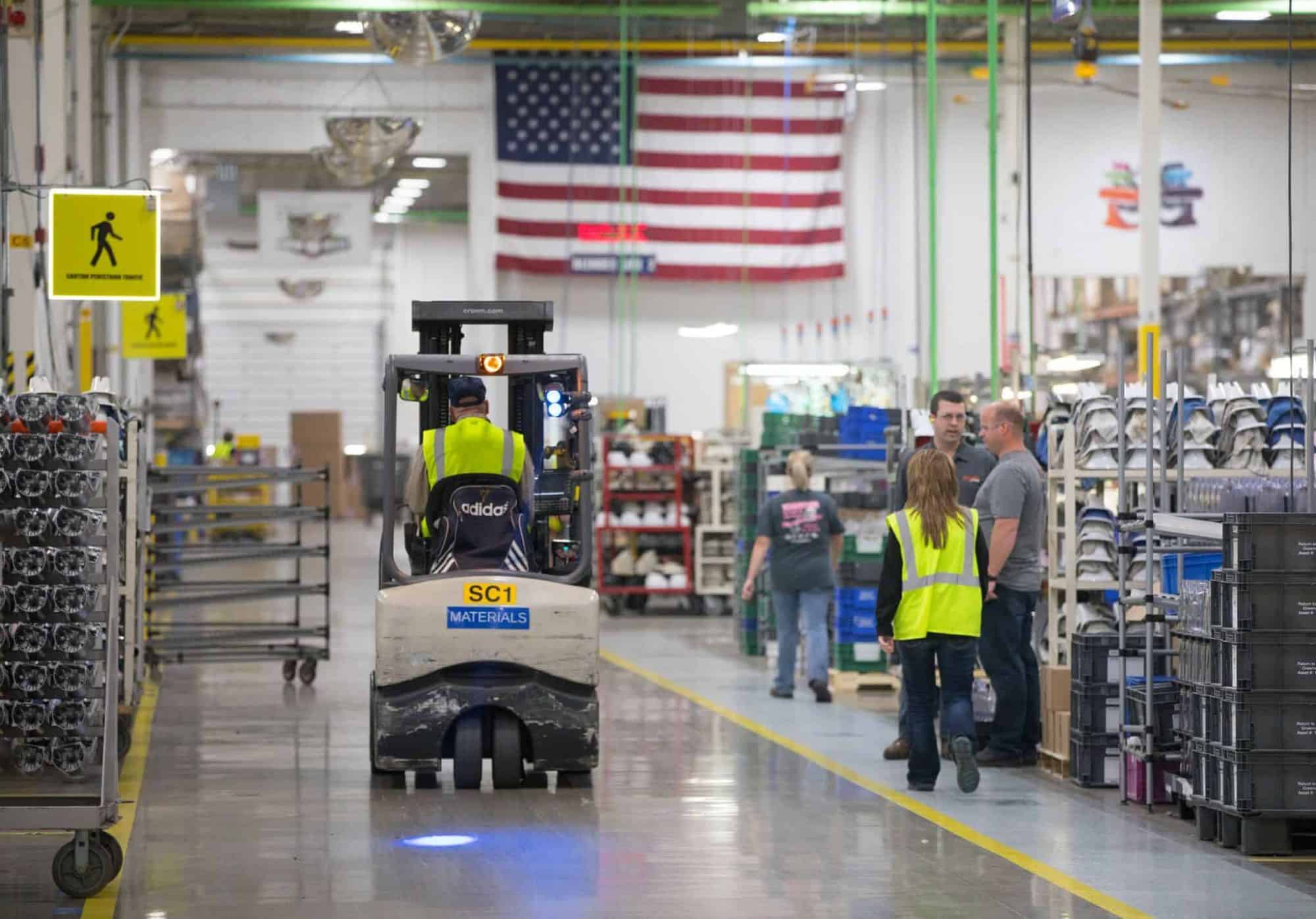
When Kristy Willis moved to Louisiana, she wasn’t sure what she wanted to do next. Her 15-year marriage had ended in divorce, and she needed to find a way to support herself and her four children. She began by searching for a college where she could gain additional education and skills—and when she came across The Manufacturing Institute’s FAME program, she knew she had found the right place. In August 2019, she began her fresh start with GeauxFAME.
What it is: The Federation for Advanced Manufacturing Education (FAME), which was founded by Toyota and is now operated by The Manufacturing Institute, is a career pathway program for current and aspiring manufacturing workers. It provides them with on-the-job training and classroom education, leading to an associate degree and an Advanced Manufacturing Technician (AMT) certificate.
A critical role: Willis viewed manufacturing as a vital part of the American economy, and was excited about the opportunity to feel connected to it.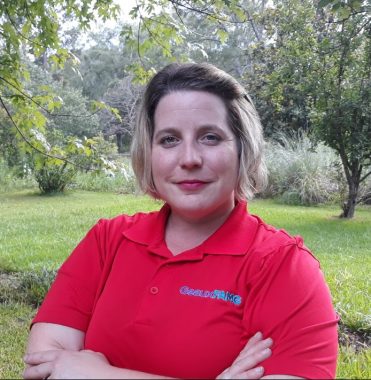
- “When I came into this program, I didn’t know anything about the manufacturing business—but I wanted to be a part of it,” said Willis. “I saw manufacturing as adding strength to the economy in the United States. Wherever you go, manufacturing is needed, and I wanted to be a part of that industry.”
Personal and professional growth: Willis was wary about returning to school after 10 years, but she was motivated by the need to provide for her children. Ultimately, spending time in the FAME program has changed the way Willis sees herself and her opportunities.
- “The experience has been humbling,” said Willis. “But it has helped build my confidence in myself and given me something to look forward to.”
Of course, Willis had to contend with a particularly challenging year as COVID-19 made traditional learning environments impossible. Still, she found the program and her experience rewarding.
- “The past year has been crazy,” said Willis. “Being a mom of four kids, when they got sent home from school, and I got sent home from school, and everyone was trying to study at the same time—our house was wild. But we grew as a family during all of this, through all these trials.”
Next up: Willis will graduate in July, and her sponsoring employer, Boise Cascade—an Idaho-based wood product manufacturer with a facility in Lena, Louisiana—has already offered her a full-time job and the opportunity to continue her education and pursue her bachelor’s degree. She’s excited about the road ahead.
Good advice: Willis also encourages people who are looking for a new career to give the FAME program a try—even if they have never considered a career in manufacturing before.
- “This program is perfect for that mindset,” said Willis. “If you want to try it out and see how it works, it gives you that opportunity. You get a big picture of the manufacturing process, as well as insights behind standard operating procedures—why these safety practices are performed, or why those machines are serviced the way they are—and then it’s up to you to continue on through the program.”
The last word: “If you’re questioning what to do with your life, stay strong and have courage,” said Willis. “You are strong and smart enough—you take those trials that have brought you down in this life, and use them to make yourself stronger.”
Manufacturing Leaders Get a Sneak Peek at Creators Wanted
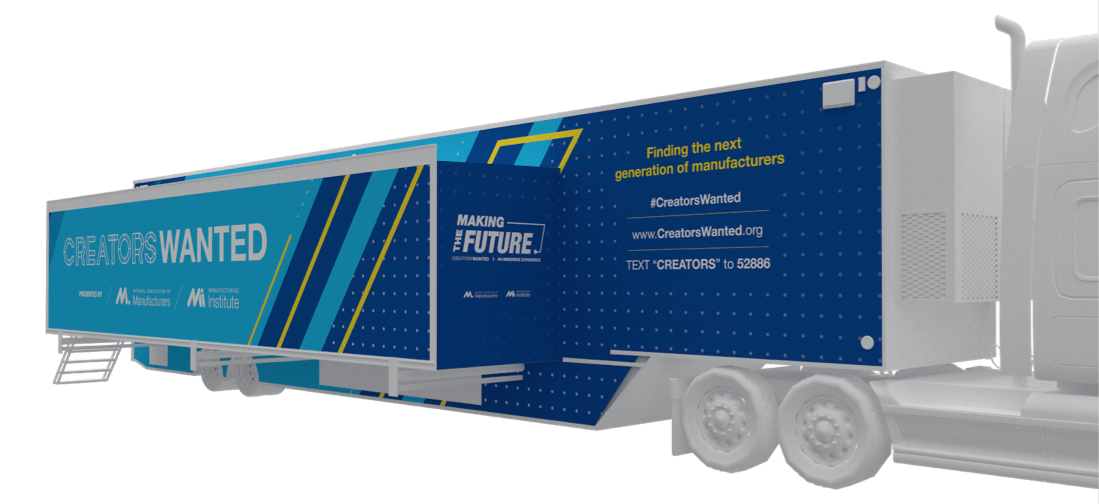
The NAM and The Manufacturing Institute unveiled their Creators Wanted experience last week in Dallas, previewing it for the NAM’s Executive Committee as well as local business leaders, workforce development officials and the media. Visitors got an exclusive look at this “mobile manufacturing experience” that will soon embark on a tour around the country, showing Americans what modern manufacturing is all about.
As NAM President and CEO Jay Timmons said, “Creators Wanted will help a new generation of emerging and displaced workers see themselves in a modern manufacturing career, while also adding to the industry’s talent pipeline by engaging veterans, women and communities of color, all critical to expanding the workforce of tomorrow.”
What they saw: Below, ExxonMobil Senior Vice President Neil Chapman, Celanese Corporation Chairman, CEO and President Lori Ryerkerk, Toyota Executive Vice President of Product Support and Chief Quality Officer Chris Nielsen and Trane Technologies Chairman and CEO (and NAM Board chair and co-chair of the Creators Wanted campaign) Mike Lamach get a first look at this interactive, hands-on experience.
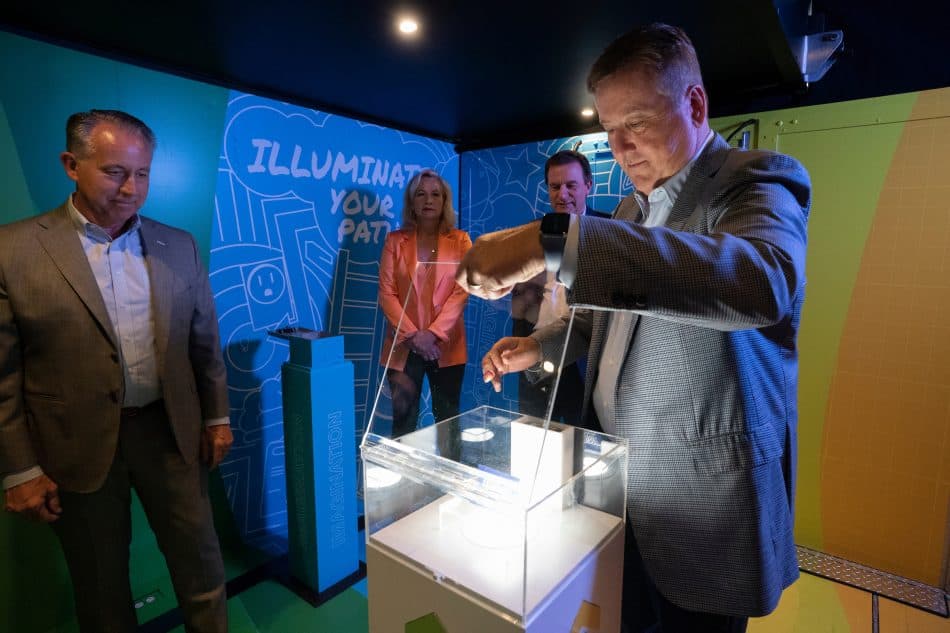
An online choose-your-own-adventure version of the mobile experience will be rolling out this summer to reach students, parental figures, teachers and emerging workers nationwide. Here, MI Executive Director Carolyn Lee previews the “Keys to Success” room, where participants will race to solve riddles that will help reinforce key attributes of manufacturing careers, such as teamwork, problem solving, imagination and communication.
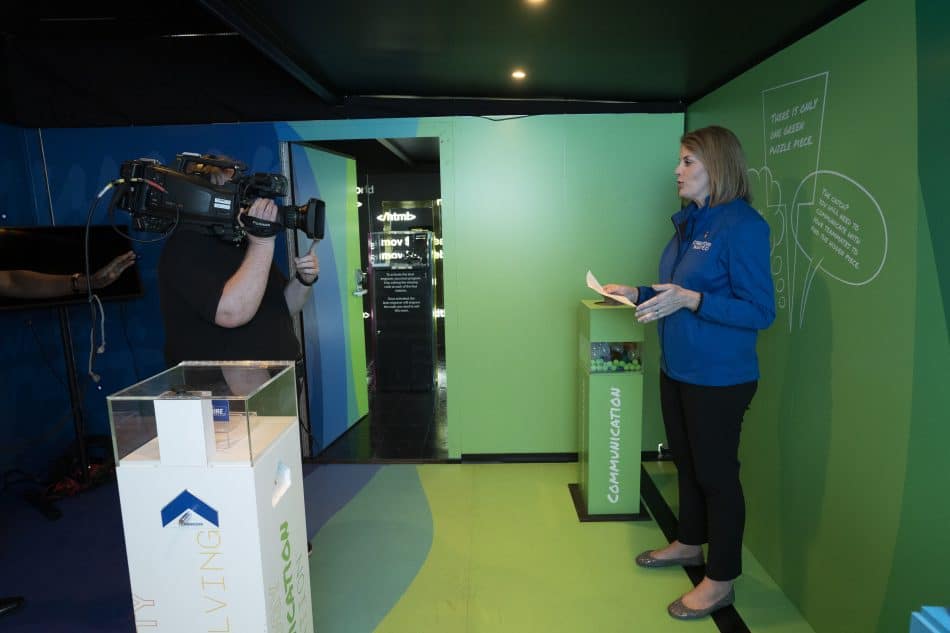
Lee also gave a presentation on Creators Wanted to the visitors. As she said in a statement, “By 2030, manufacturers need to fill more than 4 million jobs—according to research from the MI and Deloitte—but without initiatives like Creators Wanted, more than half of those jobs could go unfilled. This mobile experience will excite audiences across the country, sparking an interest in modern manufacturing so that we can connect emerging and displaced workers with resources that educate and empower.”
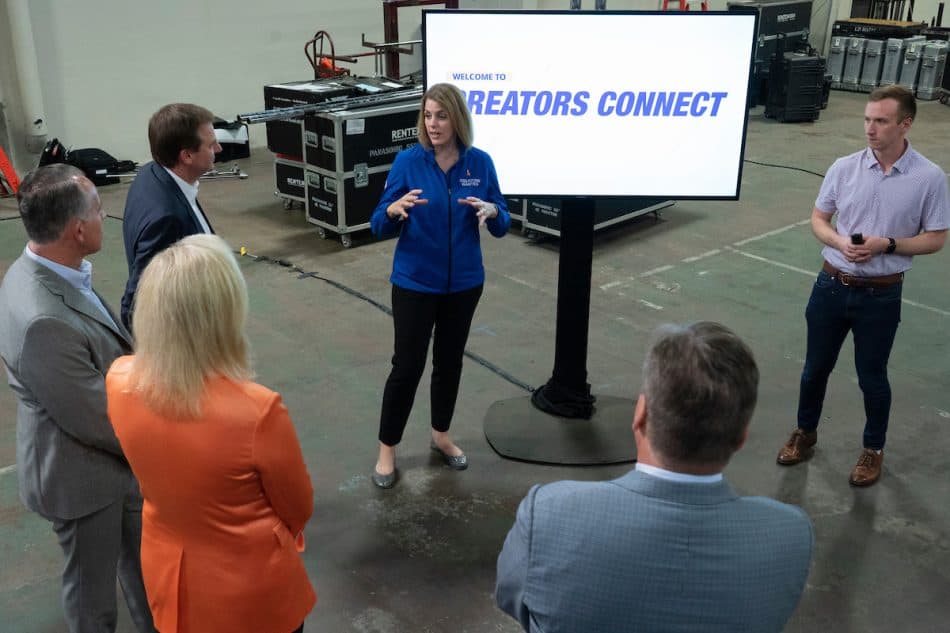
The tour allows you to experience the creativity of manufacturing firsthand and up close. In the gamified experience, participants will work as a team to solve a series of immersive challenges, requiring their full attention to think and compete. As they move through each obstacle, teams will learn more about modern manufacturing careers, the skills required to be successful and how people and technology work together.
We can’t reveal all the surprises, but doesn’t he look excited?
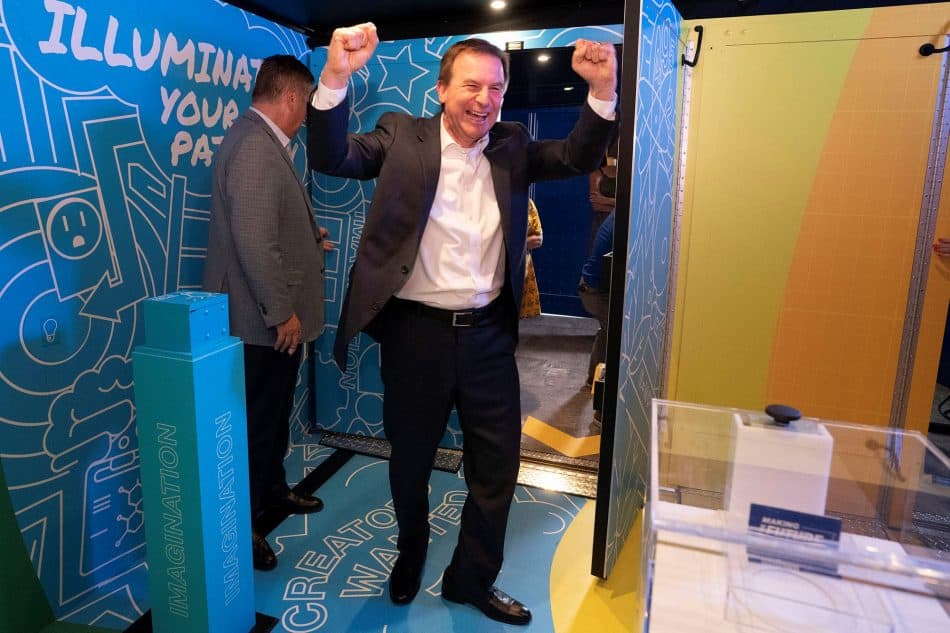
In fact, all of the NAM’s Executive Committee members who toured the exhibition were impressed and amazed by what they saw. Here are some of their reactions:
- “I will admit, I didn’t quite appreciate the opportunity for our industry until I saw the experience in person,” said Chapman. “Seeing is believing in the capacity of this tool to excite the next generation, parents, guardians and teachers about modern manufacturing careers.”
- “It’s clear that Creators Wanted has exactly the message and tools to strengthen our industry’s recruitment for talent. At a time when so many young people seek careers where creativity is valued and prized, we have a chance with this campaign to really drive the best and brightest into our talent pipeline,” said Nielsen.
- “The mobile experience is astounding; it’s unlike anything we’ve done as an industry to reach the next generation and engage emerging and displaced workers. But what makes this campaign worthwhile is that the mobile experience is just one part of a comprehensive plan to create interest and then create opportunity by providing resources to help people launch or grow a career in manufacturing,” said Lamach.
Join in: Last but not least, you too can find out what all the excitement is about. Check out https://creatorswanted.org/ for information about the campaign.
Manufacturers: Creators Wanted!
Industry Concern Over Workforce Challenges Grows Despite Record Growth in Sector
Washington, D.C. – The National Association of Manufacturers released its Manufacturers’ Outlook Survey for the second quarter of 2021. “Attracting and retaining a quality workforce” and “rising raw material costs” remain manufacturers’ biggest concerns for the second straight quarter. Despite those concerns, manufacturers predicted some of the highest expected growth rates in the survey’s history and the most positive outlook since the third quarter of 2018.
“Manufacturers see an incredible future on the horizon and are predicting growth numbers unheard of in the more than two-decade history of this survey,” said NAM President and CEO Jay Timmons. “But yet, a dark cloud still hangs over the industry. Manufacturers face long-term workforce challenges, with a record-high 851,000 open manufacturing jobs right now and more than 4 million to be filled over the next decade. While a very serious concern, manufacturers are doing everything we can to meet this challenge. The NAM and The Manufacturing Institute’s Creators Wanted campaign, including a first-of-its-kind mobile manufacturing experience, will cover thousands of miles in the second half of this year tackling the top two issues facing this critical workforce challenge: a skills gap and misperceptions about modern manufacturing.
“To keep this momentum going, elected leaders in Washington should advance policies that will enhance our competitiveness and strengthen our industry, starting with delivering bipartisan infrastructure investment. Failing to do so will rob generations to come of the opportunity to achieve their highest potential. Conversely, moving forward with proposed tax increases, as our studies have shown, would mean 1 million jobs lost in just the first two years. Anti-worker laws like the forced unionization PRO Act would upend our workplaces. Whether today’s manufacturing optimism is a passing moment or a new normal has a lot to do with the choices our elected leaders make.”
Survey highlights:
- 90.1% manufacturer optimism, highest since Q3 2018
- 3.7% expected growth in full-time employment, a record high
- 6.1% expected growth in sales over the next 12 months, a record high
- 5.9% expected growth in production over the next 12 months, a record high
Read the full Q2 2021 Manufacturers’ Outlook Survey results here.
Background on Creators Wanted:
The NAM, together with the MI, launched the Creators Wanted campaign, an unprecedented national effort to build the modern manufacturing workforce of tomorrow. By 2025, Creators Wanted aims to reduce the skills gap in the United States by 600,000, as well as increase the number of students enrolling in technical and vocational schools or reskilling programs by 25% and increase the positive perception of the industry among parents to 50% from 27%.
Creators Wanted is part of a digital campaign together with a first-of-its-kind mobile traveling manufacturing experience, and it is part of sustained initiatives at the MI targeting youth, veterans, women and other underrepresented communities.
-NAM-
The National Association of Manufacturers is the largest manufacturing association in the United States, representing small and large manufacturers in every industrial sector and in all 50 states. Manufacturing employs more than 12.3 million men and women, contributes $2.35 trillion to the U.S. economy annually and has the largest economic multiplier of any major sector and accounts for 63% of private-sector research and development. The NAM is the powerful voice of the manufacturing community and the leading advocate for a policy agenda that helps manufacturers compete in the global economy and create jobs across the United States. For more information about the NAM or to follow us on Twitter and Facebook, please visit www.nam.org.
